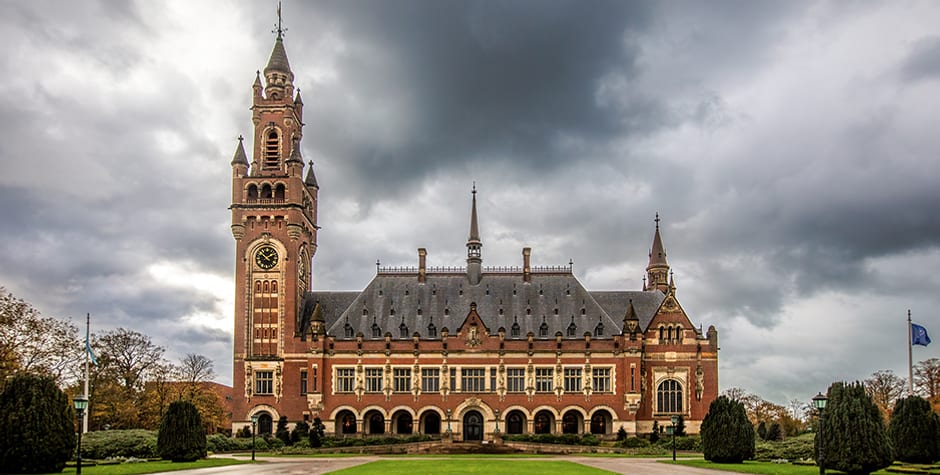ACLJ Submitted Legal Arguments to Nations Ahead of International Court of Justice Oral Arguments To Defend Israel Against False “Genocide” Accusations
The International Court of Justice (ICJ) is hearing arguments from South Africa and Israel on January 11–12, 2024 regarding South Africa’s application that accuses Israel of violating the Genocide Convention.
This is lawfare. It’s a wholly outrageous legal accusation levied against Israel as it defends its citizens against ruthless and barbaric terrorist attacks from Hamas and other jihadist armies that are bent on the utter destruction of Israel and the Jewish people.
At the ACLJ, we have prepared and submitted a legal brief to the U.N. Secretary-General, the U.N. Commission of Inquiry, and a number of States responding to South Africa’s absurd accusations. We are focusing on these nations and leaders because they have direct access to the ICJ, equipping them with the legal arguments needed to defend Israel. Those states include Germany, Lithuania, Liberia, Kenya, Italy, Hungary, Austria, Australia, Albania, Guatemala, Estonia, the Republic of Congo, Czech Republic, Croatia, Costa Rica, Canada, Togo, Romania, Papua New Guinea, Palau, Nauru, Micronesia, Marshall Islands, United Kingdom, and several other States.
On December 29, 2023, South Africa submitted the application to the ICJ, alleging that Israel is committing acts of genocide in Gaza. The application asks the ICJ to order Israel to suspend its military operations in Gaza. Today, South Africa presented oral argument at the ICJ. The Court will hear Israel’s argument tomorrow.
As we noted in our response, “South Africa’s application turns the law on the crime of genocide on its head and relies on politically charged statements by world leaders and biased United Nations’ officials as evidence of genocide.” This is also what South Africa did today in its oral argument. South Africa wholly ignores Hamas’ terrorist acts of deliberately targeting and murdering civilians, as well as Israel’s right of self-defense, from the equation. It does not even take the applicable Law of Armed Conflict (aka International Humanitarian Law) into consideration and jumps to the conclusion that Israel is committing genocide. Such an accusation is legally erroneous, factually untrue, morally reprehensible, and blatantly antisemitic.
South Africa quotes a number of statements by Israeli leaders, wrongly imputing genocidal intent to them. Further, it blames Israel for all the casualties in Gaza. As we noted in our brief:
Like many others, South Africa looks at the number of casualties—albeit likely exaggerated and unreliable numbers by Hamas—in a vacuum without any regard to whether some of the casualties were caused by Hamas’ faulty rockets fired toward Israeli civilian population centres, as well as Hamas’ actions of deliberately putting its own civilians in harm’s way, or were a sad but lawful collateral and incidental consequence of Israel’s targeting legitimate military objectives.
To say that Israel is deliberately targeting civilians is absurd. Nowhere in the entire application has South Africa established this or provided any evidence indicating such intent or evidence of actual deliberate targeting of civilians. In fact, there is ample evidence that Israel does not target civilians. Its target is the terrorist organization Hamas, not Palestinians in Gaza in general.
Our response further noted:
A state that intends to destroy a civilian population group in whole or in part does not comply with applicable laws of armed conflict. It does not invest significant resources to help the civilian population evacuate areas of hostilities. It does not secure humanitarian corridors to facilitate the evacuation of civilians from combat zones. It does not provide medical supplies to the targeted group. Israel not only is doing all of these things but is doing much more.
While South Africa falsely accuses Israel – a country that takes every precaution to spare civilian lives – of deliberately killing civilians, it ignores that Hamas deliberately butchered innocent Israeli civilians on October 7. Those deaths were not incidental to Hamas’ targeting military objectives. The entire operation was intended to murder, rape, and take hostage as many Israeli civilians as possible. Yet in South Africa’s view, that does not convey an expression of genocidal intent, nor do those acts constitute acts of genocide.
Moreover, to say that Israel is deliberately killing Palestinian civilians because of their national, ethnic, or religious identity – an important element under the Genocide Convention – is not only untrue but also antisemitic nonsense.
Our response noted:
Hamas intentionally murdered and raped Israeli civilians because they were Jewish not because they were members of the Israeli military. Israel, on the other hand, has not attacked civilians in Gaza because they are “Palestinians”. Israeli soldiers are not raping women. Israeli soldiers are not torturing and murdering civilians or taking them hostage. South Africa has presented no evidence that Israel is deliberately targeting Palestinian civilians because of their Palestinian identity. Israel is only targeting Hamas in self-defence after horrific, criminal attacks were perpetrated by Hamas. Incidental casualties resulting from an attack on a legitimate military objective does not amount to a war crime much less an act of genocide.
Finally, we noted that because South Africa provided no evidence whatsoever that Israel is deliberately targeting Palestinian civilians with specific intent to destroy Palestinians as a group because of their national, ethnic, or religious identity, the ICJ does not have any jurisdiction to order Israel to suspend its military operations. For the Court to do so would amount to restricting Israel’s right to self-defense recognized under Article 51 of the United Nations Charter.
